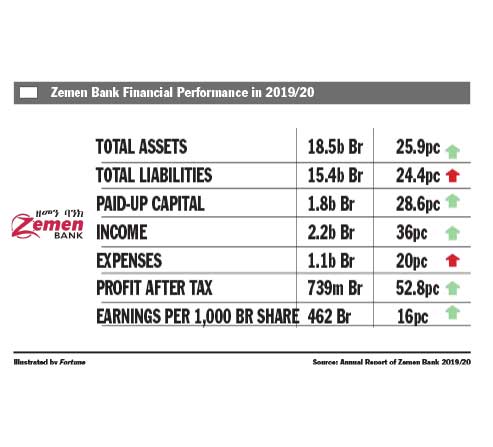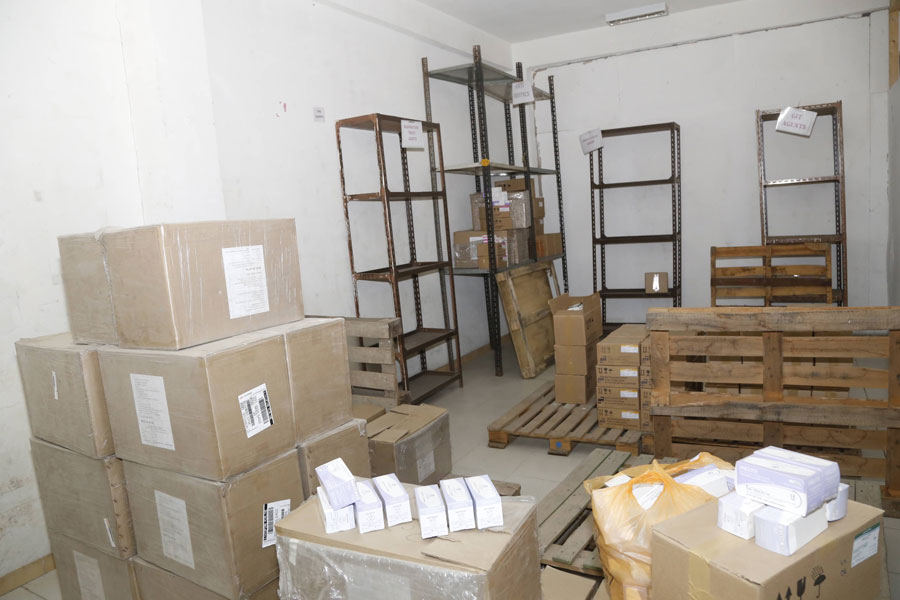
Radar | Feb 05,2022
Oct 24 , 2020
By FASIKA TADESSE ( FORTUNE STAFF WRITER )
Exporters can now use their foreign currency retention account to import different items, according to a new directive issued by the National Bank of Ethiopia (NBE). The previous directive limited the account holders to using their forex only to finance direct business and effect current payments.
The directive, which was amended after three years, gives freedom to exporters and inward remittance recipients to use 30pc of the foreign currency they generate to import pharmaceutical products, agricultural inputs, chemicals and manufacturing inputs. They can also import motor oil, baby formula, edible oil, wheat and sugar.
The amendment is aimed at encouraging exports, according to Yinager Dessie (PhD), governor of the central bank.
"We find it necessary to reconsider and incentivise eligible exporters," he said. "The former procedure had been a source of disappointment to many forex account holders."
Twelve years ago, the central bank had issued a directive allowing the regular recipients of foreign exchange remittance and exporters of goods and services to open retention accounts at commercial banks. However, the directive restricted the account holders to using the foreign currency only to finance direct business and effect current payments such as the import of certain goods, promotion and subscription fees, and the settlement of external loans.
Before the last amendment that was made three years ago, recipients of foreign currencies were opening two types of retention accounts where they keep up to 10pc of their foreign currency earnings for an indefinite period. A separate account holds the remaining 90pc and account holders have 28 days to use the foreign currency, at which time it is converted to Birr.
The last amendment relaxed the restriction by raising the indefinite holding retention figure to 30pc and reducing the other account to 70pc. However, it limited the account holders to using foreign currency only for specific purposes. The latest directive has removed this and enabled the exporters to use the foreign currency to import items that are selected by the central bank to get priority in foreign currency allocation.
This directive came onto the scene at a time when the nation's foreign currency reserve is depleted. As of the third quarter of the last fiscal year, the gross foreign reserve coverage stood at 1.6 months of imports of goods and services of the current fiscal year. This is down from the 2.4 months of coverage of the foreign currency reserve during the previous fiscal year.
Abdulmenan Mohammed, a financial expert with two decades of experience, appreciates the central bank's move in allowing account holders to use their foreign currency for imports. However, he recommends the government reconsider the 28-day deadline to convert the foreign currency into Birr.
"If the government genuinely wants to encourage exports," said Abdulmenan, "it should extend it to a reasonable time such as three months."
The central bank is also in the process of drafting a directive that allows residents of Ethiopia and non-resident Ethiopians to open a foreign currency savings account. The directive targets both nationals and non-nationals who work at international organisations and are paid in foreign currency in order to encourage them to hold a local account in foreign currency.
"Mostly the diplomats and employees of international organisations are depositing their money overseas," said Yinager. "The directive will encourage them to open an account in the country."
The draft directive, which went through two consultation hearings, allows the deposit of the dollar, pound sterling, euro, Canadian dollar, Saudi riyal, Japanese yen, Australian dollar and dirham. Other currencies have to convert to the above currencies on the spot rate of the preference of the account opener, according to the draft directive.
The savings can be used for self, spouse, and children's education, medical and travel expenses upon the submission of valid documents, according to the draft directive. However, other withdrawals will be made only in Birr, according to the directive, which also prohibited overdrawing.
"Even though it allows nationals and resident non-nationals to have a foreign currency savings account," said Abdulmenan, "it has a range of restrictions regarding its use, which will make the scheme unattractive."
For instance, withdrawals are allowed only in Birr, and the account can be used for payment of costly items. Because of the restrictions on the use of the account, the impact of the directive on foreign exchange inflows could be insignificant, according to the expert.
Early this month, the central bank has issued a new directive that rearranged the list of import items that will get first priority in foreign currency allocation. The directive also requires the banks to apportion no less than 50pc of their total foreign currency allocations for the priority areas.
Out of the total allocated value, items under the first priority are appropriated to get 10pc, while goods and services under the second and the third categories are decreed to receive 45pc each.
PUBLISHED ON
Oct 24,2020 [ VOL
21 , NO
1069]

Fortune News | Apr 02,2022

Fortune News | Jul 13,2020

Fortune News | Feb 20,2021

Radar | Feb 17,2024

Agenda | Apr 10,2021

Feb 24 , 2024 . By MUNIR SHEMSU
Abel Yeshitila, a real estate developer with a 12-year track record, finds himself unable to sell homes in his latest venture. Despite slash...

Feb 10 , 2024 . By MUNIR SHEMSU
In his last week's address to Parliament, Prime Minister Abiy Ahmed (PhD) painted a picture of an economy...

Jan 7 , 2024
In the realm of international finance and diplomacy, few cities hold the distinction that Addis Abeba doe...

Sep 30 , 2023 . By AKSAH ITALO
On a chilly morning outside Ke'Geberew Market, Yeshi Chane, a 35-year-old mother cradling her seven-month-old baby, stands amidst the throng...

Apr 13 , 2024
In the hushed corridors of the legislative house on Lorenzo Te'azaz Road (Arat Kilo)...

Apr 6 , 2024
In a rather unsettling turn of events, the state-owned Commercial Bank of Ethiopia (C...

Mar 30 , 2024
Ethiopian authorities find themselves at a crossroads in the shadow of a global econo...

Mar 23 , 2024
Addis Abeba has been experiencing rapid expansion over the past two decades. While se...